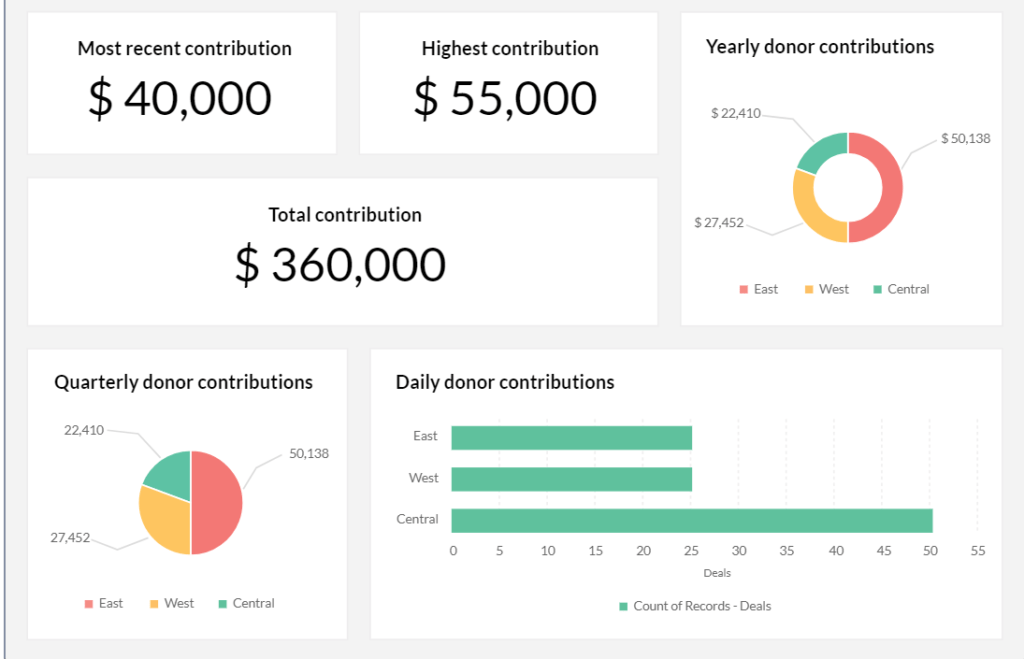CRM: An essential tool for NPOs

Quels sont les avantages d’un CRM for NPOs?
À l’ère actuelle, les NPOs face specific challenges requérant des solutions technologiques pointues pour renforcer leurs pratiques. C’est pourquoi des customer relationship management (CRM) software are proving to be an indispensable tool for NPOs. By using this type of software, they can centralize information and automate routine processes, improve communicationand personalize all contacts with their donors and members.
Nowadays, more than half of NPOs, about 54 %are now using full-featured CRM software in their operations1.
Cette tendance montre l’importance capitale de ces outils pour le succès et l’impact des OBNL.
Key points
- Centralized data for efficient management of memberships and activities.
- L’automatisation des tâches permet de gagner du temps sur les opérations récurrentes.
- A CRM improves communication and relations with donors and members.
- Les outils d’analyse offrent une meilleure personnalisation des interactions.
- IP/VoIP telephony integrated with CRM makes interactions smoother and management even more efficient.
L’essor des CRM dans les OBNL : amélioration de la gestion et de la communication
Dans le secteur des OBNL au Québec, l’utilisation d’un logiciel CRM est de plus en plus fréquent. It can help organizations to better fulfill their mission. A CRM (or Customer Relationship Management) manages relations efficiently, centralizes data and automates tasks. Ainsi, les employé(e)s et bénévoles d’un organisme ont une vue complète des relations clients. Un logiciel CRM peut donc grandement faciliter la collecte de dons, le soutien aux bénévoles et une meilleure communication.
In terms of solutions, software such as Zoho One contiennent une foule d’applications qui peuvent non seulement faciliter la gestion des données clients, mais aussi handle accounting operations and marketing. Évidemment, puisque l’intégration d’un logiciel CRM automatisent une partie des actions de tous les jours, il diminue la nécessité d’une manual data entry. Il permet aussi de centraliser et de garder l’historique des informations importantes, comme les coordonnées, les interactions sur les médias sociaux et les prises de notes3.
And what about the‘intégration d’un CRM avec la téléphonie cloud (communément appelée IP, VoIP, hébergée). Lorsque les deux outils sont mis ensemble, les organismes peuvent grandement augmenter l’efficiency of their operations. In particular, CRM integrated with IP/VoIP telephony systems improve conversations with members and donors. They ensure smooth communication and more effective follow-up. In this way, they strengthen partner loyalty.
What's more, les outils d’analyse de ces systèmes permettent de personnaliser les messages et de suivre l’évolution des campagnes. Cela aide à cibler les prospects, à personnaliser les offres et à mesurer l’efficacité des actions. Utiliser un CRM non seulement automatise, mais améliore aussi la qualité des échanges avec les parties prenantes.
Data centralization
Visit centralizing data for an NPO is essential. Une recherche récente montre que 80% des OBNL choisissent un CRM dans le but d’améliorer leurs relations avec membres, donateurs, bénévoles, mécènes et partenaires. Ceci aide donc grandement dans la gestion des adhésions et activités.
L’utilité d’un CRM est aussi de sort data together d’une façon logique. Lorsqu’une entreprise ou un organisme jongle avec de nombreuses méthodes de collectes de données, il peut être difficile d’en faire le suivi. Des outils comme Zoho peuvent donc connecter toutes les données des donateurs, bénévoles et partenaires et ce, au même endroit. Cela donne une vue d’ensemble et permet un accès rapide et logique aux infos importantes pour gérer l’association au quotidien.
This centralization also helps to manage donations and fundingwhich account for a large proportion of total NPO financing. With solutions like Zoho, tracking transactions and financial reporting is much easier. Such a tool can reduce the time spent on managing donations.
En plus, elle améliore l’engagement des membres en permettant d’envoyer des communications ciblées.
Task automation
Les CRM sont très importants pour l’automatisation des tâches au sein d’un OBNL. Le but d’automatiser est de réduire au maximum les tâches répétitives pour permettre au personnel de travailler sur des tâches de fond.
For example, Zoho CRM permet l’automatisation de l’envoi des remerciements aux donateurs, des rappels de renouvellement des adhésions, et de la planification des événements. L’applicaqtion Zoho Books peut automatiser la génération et l’envoi des factures et des reçus fiscaux. Zoho Campaigns facilite l’envoi d’emailings ciblés et personnalisés aux membres et bénévoles. Ces automatisations améliorent l’efficacité opérationnelle et assurent une gestion fluide et professionnelle des relations avec les parties prenantes.
Un CRM tel que Zoho peut aussi stocker des milliers d’informations de manière organisée et efficace, assurant un suivi fluide et une gestion optimale des données.
Improved communication
La communication est vitale pour les OBNL avec leurs membres, donateurs et autres. Lorsqu’alliées ensemble, les technologies comme CRM and cloud telephony work wonders. They help them optimize communication processes. For example, a simple call to a donor or other person can generate data that is then automatically integrated into the CRM. The next person to follow up this interaction will have all the necessary information in one place. This makes monitoring very efficient and contact management much easier. Just like tracking exchanges and payments.
With CRMs like Zoho, everything is centralized. You can manage returnskeep up to date social network contactsand plan in real time. This is crucial to strengthening the bond with the community.
Comme nous l’avons vu plus haut, l’adjonction de la cloud telephony with CRM améliore encore la communication. Les membres de l’équipe peuvent réagir vite et bien aux besoins des gens. C’est un plus pour répondre dans l’immédiat et offrir un service adapté.
(Image taken from our partner Zoho)

Campaign and event tracking
It is vital to follow campaigns and events to maximize their impact. With a CRM, NPOs can faciliter l’organisation et l’analyse des actions menées.
A good CRM for non-profit organizations can manage thousands of contacts. They are all archived in a single database. This provides a clear view of past and current interactions. In this way, the event management and NPO campaign follow-up become more coherent and efficient.
With Zoho CRM par exemple, les organismes peuvent aussi mesurer l’effectiveness of their campaigns. Les outils d’analyse offrent une vision détaillée. Ils permettent également d’ajuster les stratégies en temps réel. La personnalisation des campagnes peut favoriser les donateurs à rester engagés et peut renforcer les relations sur le long terme.
Integrating IP/VoIP telephony facilitates communication. This improves the coordination and responsiveness of teams working on NPO campaigns. Better communication simplifies event follow-up.
Data analysis
A CRM offers centralized data storage et des outils d’analyse puissants, ce qui peut être extrêmement bénéfique pour les OBNL. Par exemple, un CRM comme Zoho permet de regrouper toutes les informations des donateurs, membres et bénévoles en un seul endroit, facilitant l’accès et la gestion de ces données et leur analyse.
NPOs can track the interactions and gifts of each individual, analyser les tendances de donation, et identifier les donateurs les plus engagés. De plus, les outils d’analyse de Zoho permettent de mesurer l’efficacité des campagnes de collecte de fonds en temps réel, d’ajuster les stratégies en fonction des résultats, et de personnaliser les communications pour augmenter l’engagement.
For example, an NPO can use these analyses to send automated thank-you notes to regular donorsor to remind members to renew their membership at key moments, improving loyalty and financial support.
Using outils d’analyse des performances aide les OBNL à prendre des décisions importantes. Cela leur permet de diminuer les risques et de faire face aux obstacles. Grâce à cela, ils peuvent supporter plus efficacement leurs missions. L’automatisation aidant, c’est une approche indispensable pour gérer et optimiser les opérations de ces organisations.
Volunteer management
Volunteer management is very important for any NPO. A tool such as Zoho CRM can store and manage milliers de noms et d’informations relatives au personnel dans une base de données. This helps to better coordinate operations and make exchanges more personal.
A CRM uses custom fields to enrich information on new and existing volunteers.
Un tel logiciel peut aider avec plus que juste les bénévoles. Il améliore la façon dont on gère les finances et comment on garde les donateurs accrochés. L’automatisation libère du temps pour des contacts plus directs avec les gens, tout en utilisant des formulaires en ligne flexibles, par Zoho CRM, par exemple.
Donc, un CRM dédié aux bénévoles peut vraiment améliorer la vie d’un OBNL. Il centralise les infos, automatise des tâches et rend le contact plus humain.
L’importance d’une installation professionnelle de CRM pour maximiser les bénéfices
Un CRM est un outil incroyablement utile pour toute entité, apportant une gestion efficace des relations clients, une centralisation des données et une automatisation des tâches. Il peut transformer la façon dont un organisme interagit avec ses clients et optimise ses opérations. De plus, lorsqu’il est associé à la IP telephony, un CRM permet des communications fluides et efficaces au sein de l’organisme. Cependant, pour en tirer pleinement parti, il est crucial que l’installation et la configuration soient effectuées correctement. C’est pourquoi it is essential to refer to professionals like Allesithat can guarantee smooth installation and adapted to your company's specific needs. Allesi also offers IP telephony solutions, ensuring optimum integration for seamless communications.
FAQ
Qu’est-ce qu’un CRM et pourquoi est-il essentiel pour les OBNL ?
A CRM helps NPOs better manage their relationships with members, donors and volunteers. It centralizes all important information. It facilitates management, improves communication and automates certain tasks.
How does a CRM facilitate data centralization for NPOs?
En utilisant un CRM comme Zoho One, les OBNL ont toutes leurs données à un seul endroit. Cela simplifie la gestion des adhésions, dons, et autres informations clés. Il est essentiel pour avoir une vision globale de l’organisation et prendre de bonnes décisions.
Quels sont les avantages de l’automatisation des tâches pour les OBNL ?
Grâce à l’automatisation, les OBNL économisent du temps en ne devant pas faire des tâches manuelles. L’envoi d’e-mails, la gestion des adhésions et le suivi des dons se font plus facilement. Cela libère du temps pour des missions plus importantes.
Comment un CRM améliore-t-il la communication au sein d’un OBNL ?
A CRM connected to IP/cloud telephony makes interactions with members and donors more fluid. It offers a single platform for all communications. This makes exchanges more coherent and efficient.
How can personalized interactions benefit NPOs?
La personnalisation permet d’adapter les interactions aux besoins de chaque membre ou donateur. Cela rend l’approche plus directe et attentive, ce qui augmente l’engagement et la satisfaction.
How does a CRM help NPOs track campaigns and events?
A CRM provides tools to better organize and plan campaigns and events. It also tracks performance. This helps NPOs improve their strategies for better results.
Quels sont les outils d’analyse disponibles dans un CRM pour les OBNL ?
CRMs have tools for analyzing communications performance. They offer detailed reporting and analysis. This helps NPOs adjust their strategies based on concrete data.
How does a CRM simplify volunteer management for NPOs?
Un CRM facilite la gestion des bénévoles de plusieurs façons. Il simplifie le recrutement, suit leur implication et note leurs contributions. Cela améliore grandement l’organisation des bénévoles, augmentant ainsi leur efficacité.
How does a CRM ensure data security and compliance for NPOs?
CRMs have advanced security measures to protect data. They also help comply with privacy laws. This ensures the trust of members and donors.
